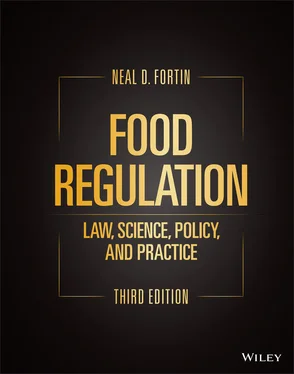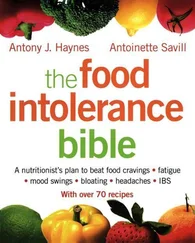Neal D. Fortin - Food Regulation
Здесь есть возможность читать онлайн «Neal D. Fortin - Food Regulation» — ознакомительный отрывок электронной книги совершенно бесплатно, а после прочтения отрывка купить полную версию. В некоторых случаях можно слушать аудио, скачать через торрент в формате fb2 и присутствует краткое содержание. Жанр: unrecognised, на английском языке. Описание произведения, (предисловие) а так же отзывы посетителей доступны на портале библиотеки ЛибКат.
- Название:Food Regulation
- Автор:
- Жанр:
- Год:неизвестен
- ISBN:нет данных
- Рейтинг книги:4 / 5. Голосов: 1
-
Избранное:Добавить в избранное
- Отзывы:
-
Ваша оценка:
- 80
- 1
- 2
- 3
- 4
- 5
Food Regulation: краткое содержание, описание и аннотация
Предлагаем к чтению аннотацию, описание, краткое содержание или предисловие (зависит от того, что написал сам автор книги «Food Regulation»). Если вы не нашли необходимую информацию о книге — напишите в комментариях, мы постараемся отыскать её.
Food Regulation: Law, Science, Policy, and Practice
Food Regulation: Law, Science, Policy, and Practice, Third Edition,
Food Regulation — читать онлайн ознакомительный отрывок
Ниже представлен текст книги, разбитый по страницам. Система сохранения места последней прочитанной страницы, позволяет с удобством читать онлайн бесплатно книгу «Food Regulation», без необходимости каждый раз заново искать на чём Вы остановились. Поставьте закладку, и сможете в любой момент перейти на страницу, на которой закончили чтение.
Интервал:
Закладка:
Food laws are sometimes challenged as infringing upon constitutionally protected individual rights. The first ten amendments to the Constitution, the Bill of Rights, define those things that government cannot do to the individual. If Congress or a state legislature enacts a law inconsistent with any of these constitutional provisions, the courts may be asked to invalidate the law as being “repugnant to the Constitution.”
In the area of food safety, however, the courts historically have been hesitant to invalidate these laws, even for the sake of protecting individual rights. Nonetheless, food laws have been challenged on this basis, and some important aspects highlighted below foreshadow issues that will rise in subsequent chapters. The cases illustrate how an individual’s rights are balanced against society’s need for protection from preventable harms.
The Bill of Rights is generally applicable to the states through the Fourteenth Amendment. Right by right, the Supreme Court has applied most, but not all, of the Bill of Rights’ restrictions to the state governments through the Fourteenth Amendment. For example, the states may not pass laws that abridge the freedom of speech, press, or assembly. Technically, the state law would be in violation of the Fourteenth Amendment, but for ease of reference, this chapter will refer to the underlying Bill of Rights amendment (in this example, the First Amendment’s protections of the freedom of speech, press, and assembly).
Free Speech
Laws may be invalidated because they conflict with the part of the First Amendment that protects the free communication of ideas: “Congress shall make no law … abridging the freedom of speech or of the press … .” As with all the Bill of Rights, the First Amendment rights are not absolute and may be abridged under certain circumstances. Justice Holmes famously noted that the First Amendment does not afford a right to cry “fire” in a crowded theater.
In Cox v. New Hampshire , 312 U.S. 569 (1941), the U.S. Supreme Court upheld an ordinance that required parade permits, although a group who challenged the law argued that it abridged their First Amendment rights of assembly and communication. The Court concluded:
The authority of a municipality to impose regulations in order to assure the safety and convenience of the people in the use of public highways has never been regarded as inconsistent with civil liberties, but rather as one of the means of safe‐guarding the good order upon which they ultimately depend … . The question in a particular case is whether that control is exerted so as not to deny or unwarrantedly abridge the right of assembly and the opportunities for the communication of thought and the discussion of public questions immemorially associated with resort to public places.
Source : Cox v. New Hampshire , 312 U.S. 569 (1941), U.S. Supreme Court. Public domain.
First Amendment issues will be discussed in later chapters regarding the right of free expression of commercial speech in conjunction with food advertising and claims.
Searches
The Fourth Amendment to the U.S. Constitution provides that:
The right of the people to be secure in their persons, houses, papers, and effects, against unreasonable searches and seizures, shall not be violated, and no Warrants shall issue but upon probable cause supported by Oath or affirmation and particularly describing the place to be searched and the persons or things to be seized.
This is particularly relevant to how agencies conduct inspections. The courts have generally upheld the validity of laws granting government agencies the right to inspect food establishments; however, the scope of inspections is more controversial. The right to take photographs and the right to access records, such as complaint files, formulation files, and personnel files, will be discussed in later chapters.
The Fifth Amendment contains three provisions that are particularly pertinent to food regulation:
Self‐Incrimination: No person shall be compelled to be a witness against himself in any criminal case.
Due Process: No person shall be deprived of life, liberty, or property without due process of law.
Just Compensation: No private property shall be taken for public use without just compensation.
Self‐Incrimination
Under the Fifth Amendment’s protection that no person shall be compelled to be a witness against himself in a criminal case, a person may refuse to answer official questions if the answers could be used as evidence against them in a criminal prosecution. This right applies not only to questioning by the federal government, but also through application of the Fourteenth Amendment, to questioning by state and local governmental agencies.
However, the Fifth Amendment protection against self‐incrimination has limited applicability to agency authority to see records or require the production of documents kept by a food establishment. Largely this is because the privilege against self‐incrimination is a personal one and does not extend to corporations and similar unincorporated collective entities or associations. 41 In addition, this privilege does not extend to the agents or custodian of the records of corporations and other collective entities. 42 Nor does the privilege extend to the sole proprietor of a business to withhold records kept under a legitimate regulatory program. 43 For example, the Fifth Amendment provides no privilege to withhold the time and temperature records a company is required to keep under food safety regulations.
On the other hand, the privilege against self‐incrimination could apply a law requiring documentation of criminal activity. For example, bookies (those running an illegal gambling operation, or “bookmaking”) cannot be compelled to register their occupation because it would be compelled self‐incrimination. 44 The difference here is the requirement concerns inherently criminal activity, while required food establishment records are essentially noncriminal and regulatory in nature.
Nonetheless, when the records and reports required to be produced by food establishments and supplied to regulatory agencies could conceivably lead to criminal prosecution, there can be a concern over the reluctance to create incriminatory records. This reluctance for candor in the records can inhibit the purpose of certain self‐regulatory measures. For instance, the requirement to document deviations from time or temperature controls and correspondingly take corrective actions is an important preventative means in keeping safety issues from reaching the consumers. If the concern over self‐incrimination prevents the effectiveness of such controls, this potential conflict has been avoided by making it a criminal offense to fail to maintain and report such records, but forbidding their use for criminal prosecution. 45
Due Process
The Fifth Amendment due process provision provides that “no person shall be deprived of life, liberty, or property without due process of law.” This clause, along with a similar provision in the Fourteenth Amendment applying due process to state governmental actions, establishes the principle that government must act fairly, according to clear procedures. In its most straightforward sense, due process means fairness in the procedural application of the law. The most basic components of due process fairness are notice and an opportunity to be heard, which were also discussed above regarding the Administrative Procedures Act.
Additionally, notice means that the government must give adequate information about legal requirements to the persons affected so that they can avoid the consequences of noncompliance. Generally, fair notice means that a law must be published before being enforced. The law must also be written clearly enough so that those subject to the law can understand what the law requires. A law that is so vague that reasonable people may not understand its meaning lacks basic fairness and violates due process. Such statutory or regulatory language could be invalidated by the courts as “void for vagueness” under the Due Process clause.
Читать дальшеИнтервал:
Закладка:
Похожие книги на «Food Regulation»
Представляем Вашему вниманию похожие книги на «Food Regulation» списком для выбора. Мы отобрали схожую по названию и смыслу литературу в надежде предоставить читателям больше вариантов отыскать новые, интересные, ещё непрочитанные произведения.
Обсуждение, отзывы о книге «Food Regulation» и просто собственные мнения читателей. Оставьте ваши комментарии, напишите, что Вы думаете о произведении, его смысле или главных героях. Укажите что конкретно понравилось, а что нет, и почему Вы так считаете.












